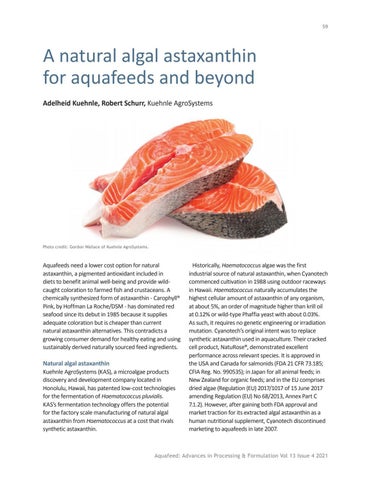59
A natural algal astaxanthin for aquafeeds and beyond Adelheid Kuehnle, Robert Schurr, Kuehnle AgroSystems
Photo credit: Gordon Wallace of Kuehnle AgroSystems.
Aquafeeds need a lower cost option for natural astaxanthin, a pigmented antioxidant included in diets to benefit animal well-being and provide wildcaught coloration to farmed fish and crustaceans. A chemically synthesized form of astaxanthin - Carophyll® Pink, by Hoffman La Roche/DSM - has dominated red seafood since its debut in 1985 because it supplies adequate coloration but is cheaper than current natural astaxanthin alternatives. This contradicts a growing consumer demand for healthy eating and using sustainably derived naturally sourced feed ingredients.
Natural algal astaxanthin Kuehnle AgroSystems (KAS), a microalgae products discovery and development company located in Honolulu, Hawaii, has patented low-cost technologies for the fermentation of Haematococcus pluvialis. KAS’s fermentation technology offers the potential for the factory scale manufacturing of natural algal astaxanthin from Haematococcus at a cost that rivals synthetic astaxanthin.
Historically, Haematococcus algae was the first industrial source of natural astaxanthin, when Cyanotech commenced cultivation in 1988 using outdoor raceways in Hawaii. Haematococcus naturally accumulates the highest cellular amount of astaxanthin of any organism, at about 5%, an order of magnitude higher than krill oil at 0.12% or wild-type Phaffia yeast with about 0.03%. As such, it requires no genetic engineering or irradiation mutation. Cyanotech’s original intent was to replace synthetic astaxanthin used in aquaculture. Their cracked cell product, NatuRose®, demonstrated excellent performance across relevant species. It is approved in the USA and Canada for salmonids (FDA 21 CFR 73.185; CFIA Reg. No. 990535); in Japan for all animal feeds; in New Zealand for organic feeds; and in the EU comprises dried algae (Regulation (EU) 2017/1017 of 15 June 2017 amending Regulation (EU) No 68/2013, Annex Part C 7.1.2). However, after gaining both FDA approval and market traction for its extracted algal astaxanthin as a human nutritional supplement, Cyanotech discontinued marketing to aquafeeds in late 2007.
Aquafeed: Advances in Processing & Formulation Vol 13 Issue 4 2021









